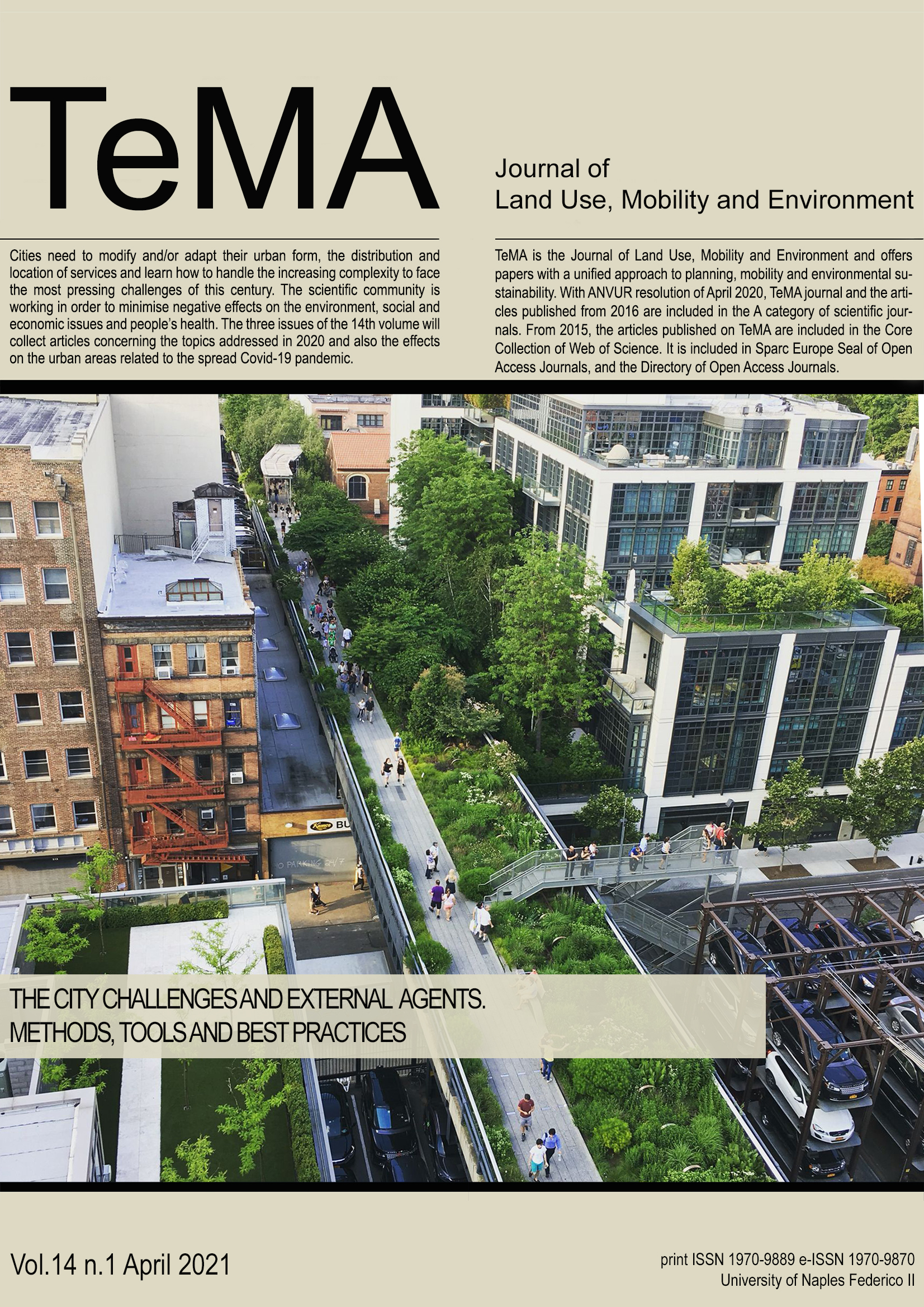Ecological transition: which transactions?
Abstract
Starting from the relationship between urban planning and mobility management, TeMA has gradually expanded the view of the covered topics, always remaining in the groove of rigorous scientific in-depth analysis. This section of the Journal, Review Notes, is the expression of a continuous updating of emerging topics concerning relationships between urban planning, mobility and environment, through a collection of short scientific papers written by young researchers. The Review Notes are made of four parts. Each section examines a specific aspect of the broader information storage within the main interests of TeMA Journal. In particular, the Urban planning literature review section aims at presenting recent books and journals, within global scientific panorama, on selected topics and issues. This contribution aims at defining the definition and intervention domain of ecological transition. The outbreak of a novel coronavirus and consequent health, economic and social crisis is leading to a new era: significant financial resources, plenty room for economic manoeuvres may turn the ongoing pandemic into an opportunity, for the next years, to build more sustainable societies and environments. Within this scenario, urban areas play an essential role, as proved in the second paragraph with the support of interesting scientific publications, which are reviewed in the contribution.
Downloads
References
Bennett, J. W. (2017). The ecological transition: cultural anthropology and human adaptation. Routledge. ISBN: 978-0-7658-0534-8.
Bianconi, F., Clemente, M., Filippucci, M., & Salvati, L. (2018). Regenerating Urban Spaces: A Brief Commentary on Green Infrastructures for Landscape Conservation. TeMA - Journal of Land Use, Mobility and Environment, 11(1), 107-118. https://doi.org/10.6092/1970-9870/5216
Bottero, M., Mondini, G., & Datola, G. (2017). Decision-making tools for urban regeneration processes: from Stakeholders Analysis to Stated Preference Methods. TeMA - Journal of Land Use, Mobility and Environment, 10(2), 193-212. https://doi.org/10.6092/1970-9870/5163
Coppola, P., & De Fabiis, F. (2020). Evolution of mobility sector during and beyond Covid-19 emergency: a viewpoint of industry consultancies and public transport companies. TeMA - Journal of Land Use, Mobility and Environment, 81-90. https://doi.org/10.6092/1970-9870/6900
Gargiulo, C., Gaglione, F., Guida, C., Papa, R., Zucaro, F., & Carpentieri, G. (2020). The role of the urban settlement system in the spread of Covid-19 pandemic. The Italian case. TeMA - Journal of Land Use, Mobility and Environment, 189-212. https://doi.org/10.6092/1970-9870/6864
Gargiulo, C., & Russo, L. (2017). Cities and Energy Consumption: a Critical Review. TeMA - Journal of Land Use, Mobility and Environment, 10(3), 259-278. https://doi.org/10.6092/1970-9870/5182
Guida, C. (2020). After recovery: towards resilience. TeMA - Journal of Land Use, Mobility and Environment, 13(2), 259-264. https://doi.org/10.6092/1970-9870/7046
Levin, D. A. (2004). The ecological transition in speciation. New Phytologist, 161(1), 91-96. https://doi.org/10.1046/j.1469-8137.2003.00921.x
Meadowcroft, J., Banister, D., Holden, E., Langhelle, O., Linnerud, K., & Gilpin, G. (Eds.). (2019). What next for sustainable development?: Our common future at thirty. Edward Elgar Publishing. ISBN: 978-1-78897-519-3
Mulvaney, D. (2020). Sustainable Energy Transitions. Socio-Ecological Dimensions of Decarbonization. Springer Berlin Heidelberg. ISBN: 978-3-030-48912-0
Pietzsch, J. (Ed.). (2020). Bioeconomy for Beginners. Springer Berlin Heidelberg. ISBN: 978-3-662-60390-1
UN General Assembly, Transforming our world: the 2030 Agenda for Sustainable Development, 21 October 2015, A/RES/70/1, available at: https://www.refworld.org/docid/57b6e3e44.html [accessed 13 March 2021]
United Nations, World Economic Situation and Prospects 2017, 2017, available at: https://www.refworld.org/docid/587f35e24.html [accessed 13 March 2021]
Copyright (c) 2021 TeMA - Journal of Land Use, Mobility and Environment

This work is licensed under a Creative Commons Attribution 4.0 International License.
Authors who publish in this journal agree to the following:
1. Authors retain the rights to their work and give in to the journal the right of first publication of the work simultaneously licensed under a Creative Commons License - Attribution that allows others to share the work indicating the authorship and the initial publication in this journal.
2. Authors can adhere to other agreements of non-exclusive license for the distribution of the published version of the work (ex. To deposit it in an institutional repository or to publish it in a monography), provided to indicate that the document was first published in this journal.
3. Authors can distribute their work online (ex. In institutional repositories or in their website) prior to and during the submission process, as it can lead to productive exchanges and it can increase the quotations of the published work (See The Effect of Open Access)

